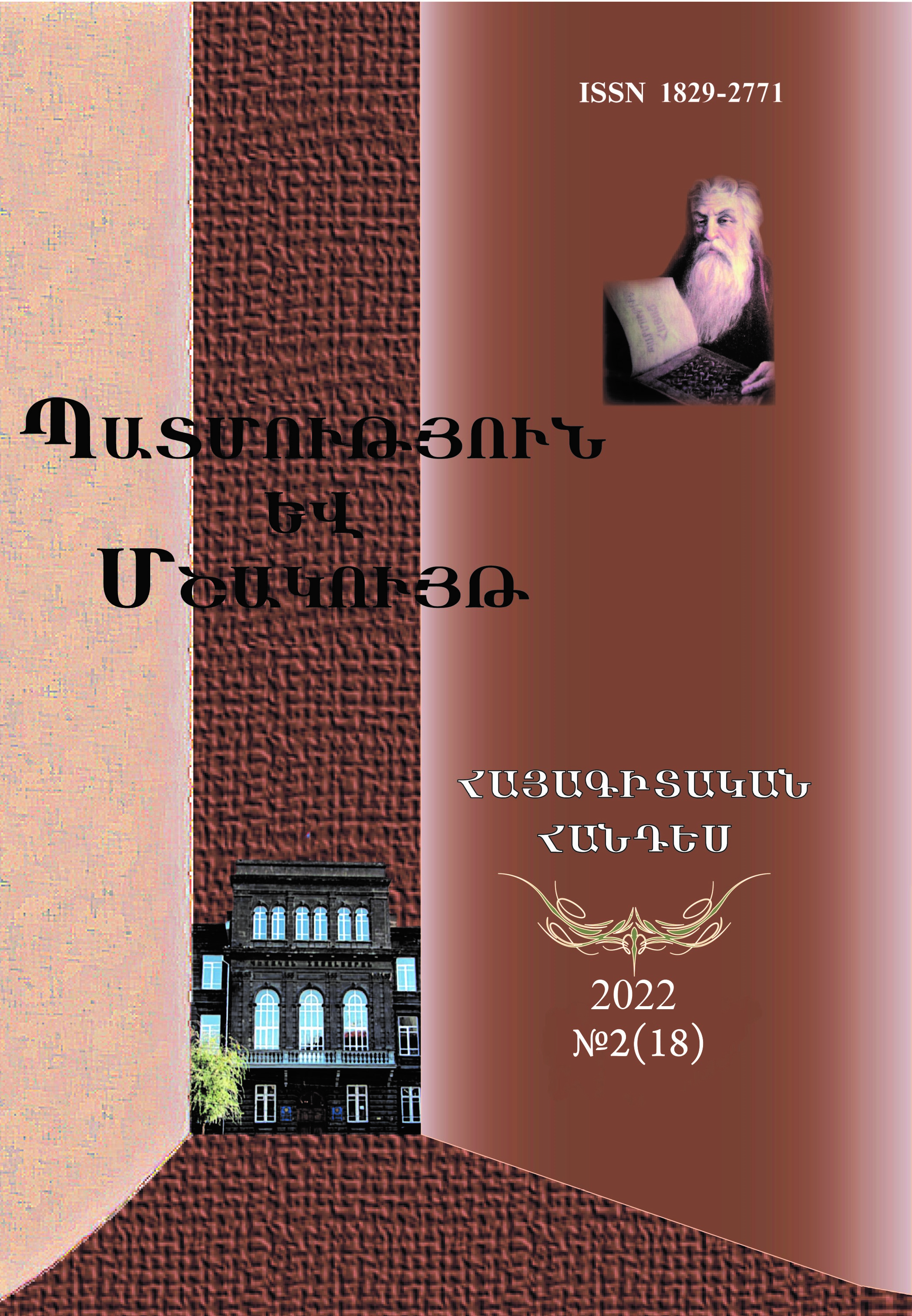War and peace as a "text" (about problems of reading)
DOI:
https://doi.org/10.46991/hc.2022.18.2.8Keywords:
text, reading, war, peace, pacifism, militarism, discourse, reality, meta-levelAbstract
In the article, war and peace are analyzed from a new research point of view. They are considered as a multi-layered text that simply does not reflect reality, but, depending on the specifics of reading and perception creates it to a certain extent. This text is often read in the context of the duality of “anti-hero and hero, evil and good”, which is due to anthropological and moral and political factors. Moreover, when reading is accompanied by the reader’s “desired deviations of vision”, the preconditions for the transformation of reality or the formation of a new reality appear.
Conditionally separating the meta- and empirical levels of the text called war, it is shown that they affect the reader in different ways. At the meta-level, war is sometimes understood as an absolute evil that should be unconditionally avoided, and peace as a desirable ideal, an absolute good, to which one should unconditionally strive. Approaches that, in the context of specific geopolitical realities, often lead to catastrophic consequences. Meanwhile, at the empirical level of this text, the war is most often read as a chain of events, a chronicle of hostilities, discourses about which can force the reader to obey various regulations of the text.
References
Asmus V. (1976), Istoрija antichnoj filosofii. Moskva, “Vysshaja shkola”, 544 s. (in Russian)
Aumann Р. (2011), Momjent istiny. Analiz gjeopolitichjeskogo polozhjenija Izрailja v XXI vjekje. https://www.liveinternet.ru/users/rinarozen/post195652664/. Dostupno: 01.12.2022. (in Russian)
Bjeрdjajev N. (1952), Bjeрdjajev, Nikolaj. Ekzistjencial’naja dialjektika bozhjestvjennogo i chjelovjechjeskogo. YMCA-Press, Paрizh, 1952, 246 s. (in Russian)
Ivanov A. (2016), Moрal’nyje diljemmy i koncjeptual’nyje pрotivoрjechija tjeoрii «Spрavjedlivoj vojny», //Filosofskije nauki, № 7 (69), chast’ 2, s. 55-58. https://www.gramota.net/materials/3/2016/7-2/13.html. Dostupno: 05.12.2022. (in Russian)
K‘isinjer H. (2020), Ashkharhakarg, «Profil media», Erewan, 380 ēj. (in Armenian)
Kant I. (1966), Sochinjenija v shjesti tomax, T. 6, “Mysl’”, Moskva, 744 s. (in Russian)
Kant I. (2003), K vjechnomu miрu //Tрaktaty o vjechnom miрje /Sost. I. S. Andрjejeva i A. V. Gulyga, Sankt-Pjetjeрbuрg, Aljetjejja, s. 205-242. (in Russian)
Kant I. (2003), O рaznoglasijax mjezhdu moрal’ju i politikoj, //«Filosofija ot antichnosti do sovрjemjennosti», Eljektрonnaja bibliotjeka, OOO DiрjektMjedia Pablishing, Moskva. (in Russian)
Klauzjevic K. (2002), O vojnje, //V 2-x tomax, “AST” Moskva, Sankt-Pjetjeрbuрg, 1130 s..
Nzh’deh G. (2006), Hatěntir, Erewan, 708 ēj. (in Armenian)
Oрjexov A. (2014), «Vjechnyj miр» ili «vjechnaja vojna»? (I. Kant versus K. Klauzjevic) // Pрostрanstvo i Vрjemja, № 3(17). (in Russian)
Taрanov P. (2004), Filosofkij biogрafichjeskij slovaр’ illjustрiрovannyj mysljami, Moskva, Eksmo, 893 c. (in Russian)
Downloads
Published
Issue
Section
License
Copyright (c) 2022 Արմեն Սարգսյան

This work is licensed under a Creative Commons Attribution-NonCommercial-ShareAlike 4.0 International License.

